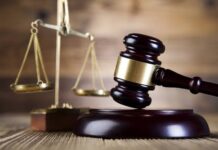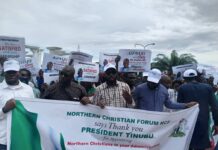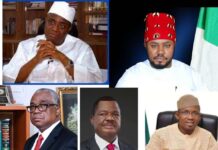Just by yesterday, we were all talking about 2018, but there is no way one can talk about last year without looking at the memorable times of the year under review, the good and bad memoirs,
At the beginning just as individuals and groups made their new year resolutions so was the nation and its citizens expect memorable time out, but the year has ran through, leaving on its trail dust of high power political and economic intrigues, drama, bitterness, uncertainties and deaths
Many northern states – Benue, Plateau, Zamfara, Nasarawa, Borno, Yobe and Taraba were hotbeds of violence and killings. Herdsmen and farmers clashes left more than 7,000 dead including of course, victims of sectarian clashes, insurgency and the ever recurring Boko Haram. There were indeed tears of blood and gnashing of the teeth on account of these attacks.
Besides the human casualties in the hand of these attacks, the year under review also had its portion of the floods that ravaged the country. No fewer than 32 states of the country were ravaged by floods which claimed no fewer than 270 lives, displaced over 350,000 people and destroyed properties worth billions of naira.
The year under review had its share of some eminent Nigerians and elder statesmen who died the most current of course was the death of the first civilian President of Nigeria, Alhaji Shehu Shagari; Air Chief Marshal Alex Badeh, rtd; Chief Anthony Anenih, Sen.Ali Wakili, Chief Sonny Odogwu; Alhaji Maitama Sule, Senator David Dafinone; Dr. Frederick Fasehun; Hon. Funke Adedoyin; Major-General Idris Alkali (retd); Professor Sophie Oluwole; Ace comedian, Baba Sala; and Raggae icon, Ras Kimono among others.
On the political scene, the year kicked off with the bickering and mistrust between the National Assembly leadership and the Executive arm of government, which affected passage of the 2018 budget; the refusal of President Buhari, on four occasions, to assent the Electoral Act amendment bill; and approval of funds for the conduct of the 2019 polls for the Independent National Electoral Commission, INEC; and a host of other bills.
One of the high-points of the executive-legislature face-off was the attempt to change the leadership of the National Assembly when President Buhari was on a 10-day vacation abroad and Vice President Yemi Osinbajo was in-charge. Following a rash of defections and counter-defections, some All Progressives Congress, APC, leaders and senators clamoured for a change of leadership in the Senate. This was after Senate President Bukola Saraki left the APC for the opposition Peoples Democratic Party, PDP, with the likes of Senator Dino Melaye, Senator Musa Kwankwaso and 12 others. On the same day, 37 members of the House of Representatives left the APC for other parties and the PDP was the main beneficiary.
Thereafter, it was the turn of Senator Godswill Akpabio, the PDP minority leader and a couple of PDP lawmakers defected to the APC. Akpabio relinquished his minority post and urged Saraki to do same, which the latter rejected. The outcome was a high-wire political chess game. Operatives of the Department of State Service, DSS, laid siege to the homes of Senate President Saraki and Deputy Senate President, Ike Ekweremadu as well as the entrance of the National Assembly. The ploy was to pave the way for an APC senator to emerge as Senate president in the absence of Saraki and Ekweremadu. However, Saraki got wind of the plot. He effectively beat it to preside at the Senate where he announced the defection of 14 senators and adjoined for a two-month recess.
It was not fun for the Acting President Osinbajo who was piqued by the DSS invasion of the National Assembly without his order. He sacked the DSS Director General, Lawal Daura, over the matter.
Before then, the Senate was invaded, in April, by some hoodlums, who snatched the mace and walked away. A Delta senator was fingered as the mastermind of the mace theft. The mace was later recovered by the police under a bridge in the nation’s capital,Abuja.
Major political defections of 2018 included the return of Alhaji Atiku Abubakar and Governors Aminu Tambuwal (Sokoto) and Abdulfatah Ahmed (Kwara) to the PDP as well as that of former Governor of Delta State, Dr Emmanuel Uduaghan, from the PDP to the APC.
It must be mentioned ,however ,that during the year under review, One of the major events was the reconciliation of former President Olusegun Obasanjo and his deputy, Atiku Abubakar after 15 years of feud. Atiku reconciled with Obasanjo shortly after picking the PDP presidential ticket.
Obasanjo, who had earler in the year written an open letter to President Buhari asking him not to seek re-election, endorsed Atiku for the presidency and urged Nigerians to forgive and vote for him because he had learned his lessons.
Throughout the year, the polity was greeted with the exchange of brick-bats between APC and PDP leaders. While the APC blamed its inability to quickly turn the fortunes of the country around on the 16 years of PDP’s alleged misrule and plundering of the country’s patrimony, the opposition party said the ruling party was incompetent, clueless and lacked ideas to do the needful to save the country.
Governor Akinwunmi Ambode ,however, lost the APC governorship primary and became the first civilian governor of Lagos that will not get a second term. His deputy, Idiat Adebule, ditched him and joined the party leadership on the matter.
Then came the presidential primaries, 14 million APC members elected President Buhari as the APC presidential candidate via direct primaries across the country. Chief John Oyegun lost out and Comrade Adams Oshiomhole emerged as the APC national chairman. After controversial primaries in many states, Oshiomhole survived plots by some governors to get him out of the seat. He was at daggers drawn with Governors Rochas Okorocha (Imo), Ibikunle Amosun (Ogun), and Rotimi Akeredolu (Ondo) among others, who could not get some of their candidates to clinch the APC tickets in their states.
Also in the year under review, Senate President Bukola Saraki, after three years of trial, got acquitted of the false assets declaration charges filed against him. The polity was entertained by the unending dramatic tango between Senator Dino Melaye and the police.. The drama is still on.
Also APC won the governorship elections in Ekiti and Osun states amid allegations of irregularities and use of security agencies to intimidate the opposition.
Surprisingly, no fewer than 70 politicians including Buhari, Atiku, Oby Ezekwesili, Kingsley Moghalu, and Omoyele Sowore emerged as presidential candidates, the highest in the history of presidential elections in the country.
- On leaving office as Ekiti State governor, Mr. Ayodele Fayose went to the Economic and Financial Crimes Commission, EFCC, office where he was detained, quizzed and later released.
- President Buhari’s school certificate brouhaha re-emerged with the president, who did not attach his credentials to his nomination form telling the INEC that the documents were with the Military Board. However, President Buhari on November 2 received attestation and confirmation of result certificate from WAEC Registrar, Dr. Iyi Uwadiae, at the Aso Villa, Abuja.
- Via Executive Order 6, the Federal Government placed travel ban on 50 high profile Nigerians being investigated for corruptio
- Finance Minister, Mrs Kemi Adeosun resigned over forgery of NYSC exemption certificate.
- Senate vowed to probe Vice President Osinbajo and NEMA DG, Mr Mustapha Maihaja over alleged mismanagement of N33 billion Presidential Intervention Programme for North East funds and approval of N5.8 billion without due process already being probed by the House of representatives.
- The private jet and documents of Alhaji Atiku Abubakar were searched by a combined team of security agents in Abuja upon arrival from Dubai, where he went to rest after the PDP presidential primaries. The matter raised dust in the polity.
- Organised Labour embarked on a two-day strike over N30,000 minimum wage and has threatened to resume the strike next week if President Buhari did not start implementation of the minimum wage by sending a bill to the National Assembly by December 31, 2018.
- Academic Staff Union of Universities, ASUU, also embarked on strike to force the government to implement agreements it reached with the union over funding of the universities.
- Campaigns for the 2019 polls were low-key. There were little or no poster wars, campaign adverts in newspapers, jingles on radio and television.
*The polity was awash with poor economic indices such as Nigeria emerging as world poverty capital with 88 million people living in extreme poverty; and 13.2 million children being out of school among others.
- 71 members of the House of Representatives initiated moves to re-introduce the parliamentary system of government in the country. The Bill has passed first reading.
As Nigerians have cross-over to 2019, new expectations and resolutions are on the platform. Welcome to 2019.











